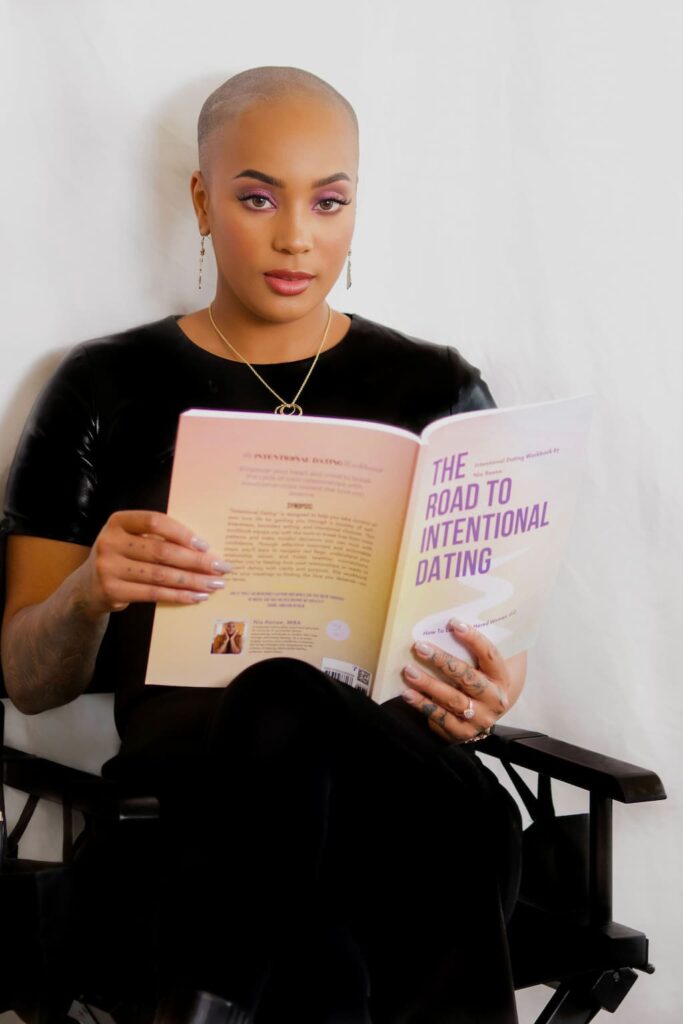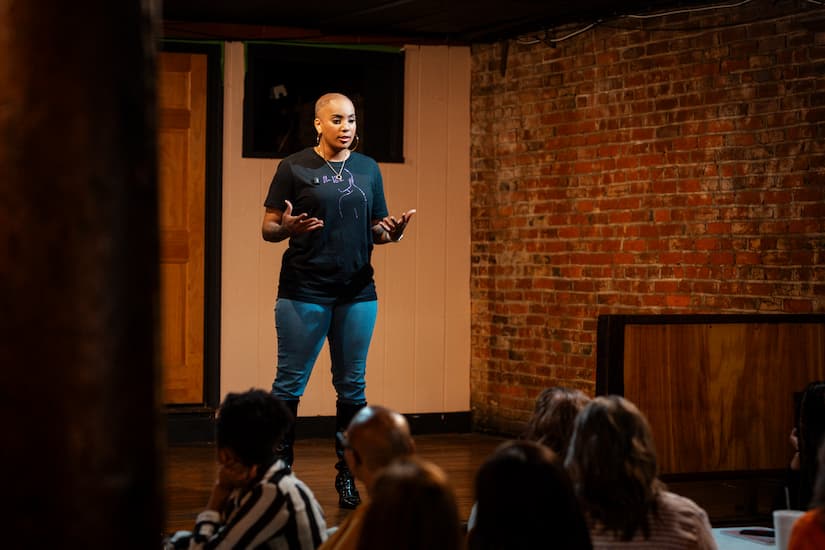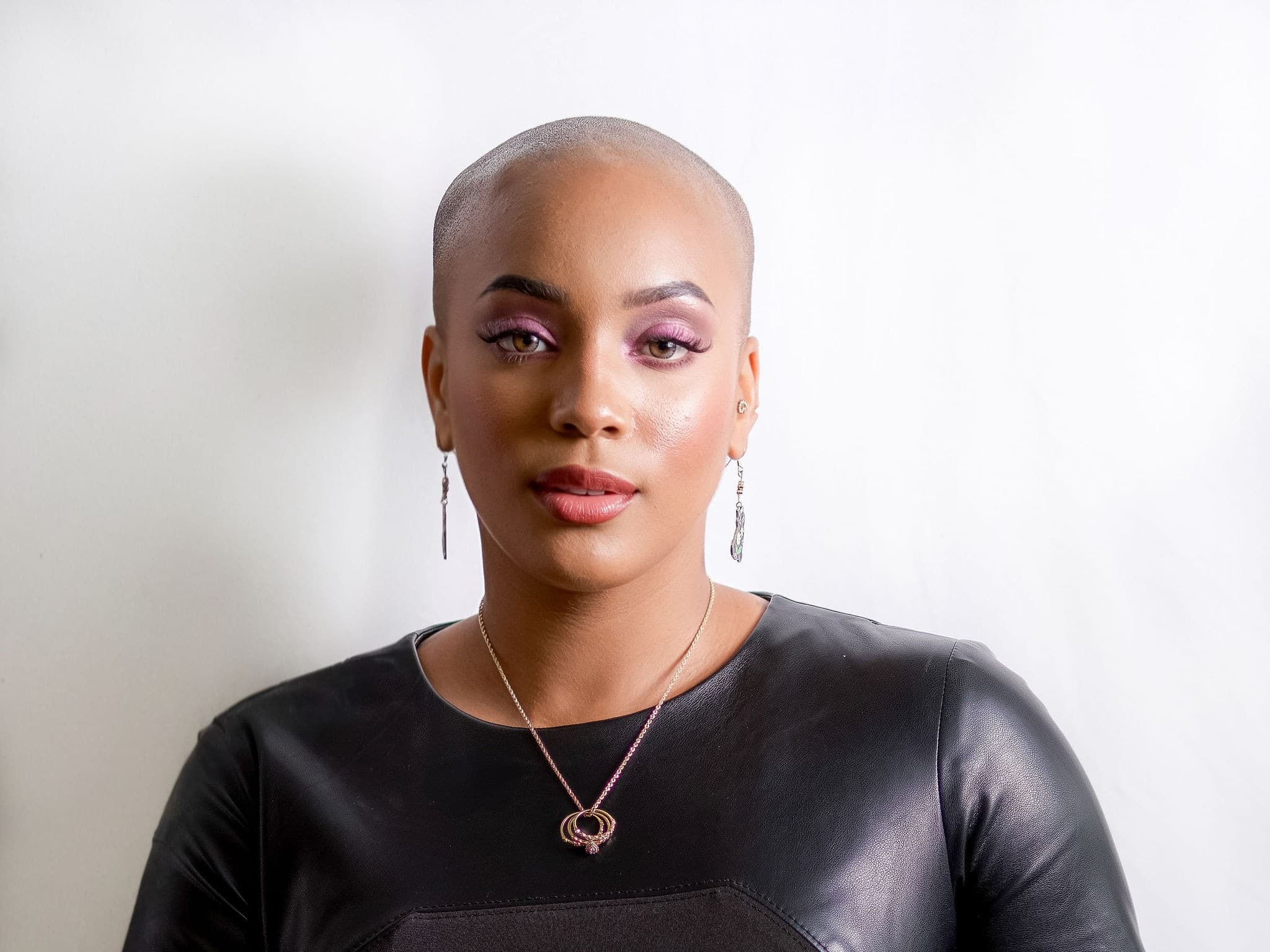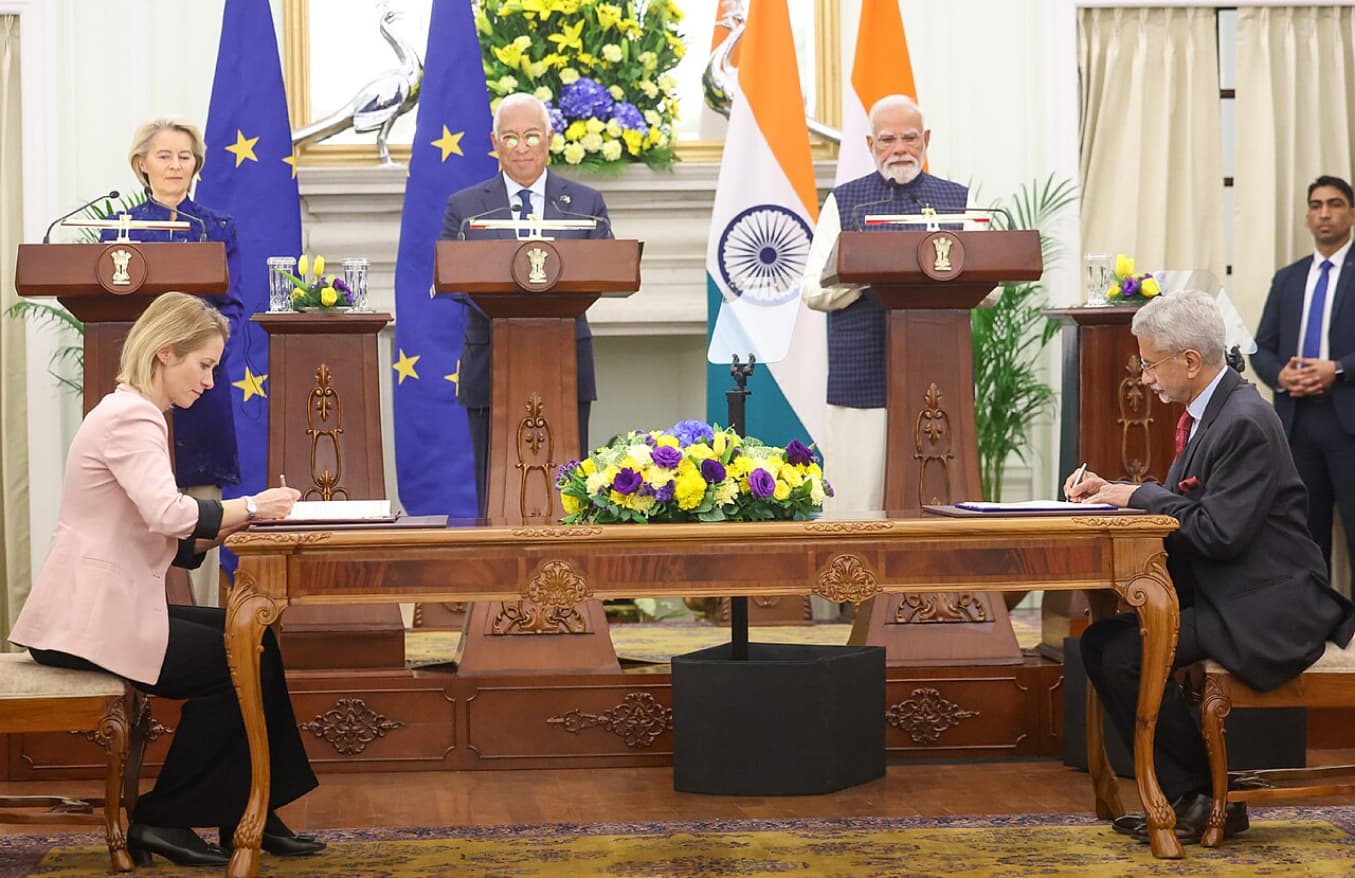In a world where survival stories often end with mere endurance, NiaRenee’s journey stands as a testament to the extraordinary power of transformation. Her path from a chaotic childhood through domestic abuse, multiple brain surgeries, and chronic illness to becoming one of the most authentic voices in trauma recovery represents more than personal triumph. It embodies the sacred alchemy of turning wounds into wisdom, pain into purpose.
“My journey started in a chaotic home, shaped by emotional abuse that followed me into adulthood,” NiaRenee reflects with the hard-won clarity that only comes from deep healing work. “I didn’t know I was in an abusive relationship until I was already trying to recover from it.”
The convergence of emotional and physical trauma created what might have broken a lesser spirit. Around the same time she was navigating the aftermath of an abusive relationship, NiaRenee received a devastating medical diagnosis: three rare brain disorders requiring six brain surgeries. Her body was shutting down just as she was trying to find herself, creating a perfect storm of vulnerability and strength.
“How to Love a Battered Woman began as a blog during my relationship. I was unknowingly writing from survival, hoping someone would learn to love me right,” she explains. “Shortly after leaving, I learned that I needed to love me the way I wished others would love me.”
This profound realization became the cornerstone of everything that followed. What started as a desperate plea for love from others transformed into a revolutionary approach to self-love and healing that would eventually touch thousands of lives worldwide.


THE AWAKENING: FROM SILENT SURVIVOR TO CERTIFIED ADVOCATE
The transformation from survivor to advocate rarely happens overnight, and NiaRenee’s evolution was no exception. Her defining moment came not in isolation, but in community. After leaving her narcissistic ex-partner, She started blogging about her experiences and began speaking up on social media.
“I realized how along I felt, and wanted to help others feel less alone,” she recalls. “I wanted to help survivors see that what happened to them wasn’t their fault and that healing was possible.”
This recognition sparked something deeper than personal healing. It ignited a calling to serve others walking similar paths. The decision to become certified as a coach represented more than professional development; it was a commitment to transform lived experience into structured guidance for others navigating the treacherous waters of abuse recovery.
Her approach to certification was deeply intentional, understanding that expertise in trauma recovery requires more than academic knowledge. “Becoming certified gave me the tools to turn my lived experience into guidance for others,” she notes, highlighting the crucial bridge between personal understanding and professional competence.
THE INTERSECTION OF TRAUMA: WHERE DISABILITY MEETS ADVOCACY
NiaRenee’s identity as a disabled woman living with chronic illness adds layers of complexity and authenticity to her work that sets her apart in the trauma recovery space. Her experience navigating medical systems while healing from abuse provides her with unique insights into the interconnected nature of trauma.
“Being disabled and living with chronic illness has made me deeply empathetic,” she explains. “I know what it’s like to have your pain questioned or dismissed. I show up in my coaching as someone who understands how physical and emotional trauma intersect.”
This understanding translates into a coaching practice that centers accessibility, flexibility, and compassion. Unlike approaches that might treat emotional and physical trauma as separate issues, NiaRenee’s work acknowledges their intricate relationship and the ways they compound each other’s effects.
Her visibility as a disabled woman in trauma recovery spaces also serves a crucial advocacy function, challenging narratives that position disability as something to overcome rather than a valid part of human experience that deserves accommodation and respect.
BREAKING THE GASLIGHTING CYCLE: THE BATTERED HEARTS RISING FRAMEWORK
The unique challenges faced by survivors of narcissistic abuse require specialized approaches, and NiaRenee’s Battered Hearts Rising framework addresses these with surgical precision. Having lived through the disorienting experience of gaslighting, she understands the particular ways narcissistic abuse erodes a survivor’s sense of reality.
“They often struggle with self-trust,” she observes. “They’ve been gaslit so deeply that they second-guess their own reality. Through my Battered Hearts Rising framework, I help them recognize patterns, rebuild clarity, and start trusting themselves again.”
This framework doesn’t just address symptoms; it tackles the fundamental erosion of self-trust that makes recovery so challenging. By helping survivors recognize patterns and rebuild their internal compass, the approach creates sustainable healing rather than temporary relief.
The work requires patience and persistence, qualities NiaRenee has developed through her own healing journey. She understands that recovering from narcissistic abuse isn’t about forgetting what happened, but about reclaiming the ability to trust one’s own perceptions and instincts.
INTENTIONAL DATING: CHOOSING HEALING OVER HABIT
One of NiaRenee’s most distinctive contributions to trauma recovery is her approach to intentional dating, a concept that challenges survivors to move beyond reactive patterns into conscious choice-making. Her philosophy recognizes that many survivors unconsciously seek familiar dynamics, even when those patterns are unhealthy.
“Intentional dating is about moving from reaction to intention,” she explains. “Survivors often date from wounds, they’re drawn to what’s familiar, not what’s healthy. I help them slow down, identify their values, and date from self-awareness.”
This approach requires a fundamental shift in perspective. Rather than focusing on finding “the one,” intentional dating prioritizes choosing oneself first. It’s a radical act of self-love that challenges cultural narratives about romantic relationships while providing practical tools for healthier connections.
The methodology involves deep self-reflection, values clarification, and the development of discernment skills that extend far beyond romantic relationships. By learning to date intentionally, survivors develop broader capabilities for making choices from a place of clarity rather than woundedness.
THE ALCHEMY OF COACHING: STRUCTURE MEETS SOFTNESS
NiaRenee’s coaching practice represents a unique blend of structure and compassion that addresses both the practical and emotional needs of trauma survivors. Her approach recognizes that healing requires both tools and tenderness, frameworks and flexibility.
“My work blends education, reflection, and lived experience,” she describes. “I offer structure and softness. We explore trauma responses, set boundaries, and work on showing up with honesty and self-respect. The goal is always to create safety within, so they no longer seek it in the wrong places.”
This internal focus distinguishes her approach from methods that emphasize external changes without addressing internal wounds. By helping clients develop internal safety and self-trust, the work creates lasting transformation rather than surface-level adjustments.
The integration of lived experience with professional training creates a coaching environment where clients feel both understood and guided. Survivors working with NiaRenee benefit from her deep empathy while receiving structured support for their healing journey.
TRIUMPH THROUGH TRANSFORMATION: CLIENT SUCCESS STORIES
The true measure of any healing approach lies in its impact on those it serves, and NiaRenee’s client success stories reveal the profound transformation possible through her methods. One particularly resonant example illustrates the depth of change her work facilitates.
“One client came to me believing she was the problem in every relationship. She had never seen herself clearly,” NiaRenee shares. “Through our work, she left a manipulative partner, started therapy, and began speaking up for her needs. She told me, ‘I finally feel like I’m living, not just surviving.’ That hit me deeply.”
This story captures the essence of NiaRenee’s impact. Her work doesn’t just help survivors cope with trauma; it helps them reclaim their lives, their voices, and their sense of self-worth. The transformation from survival to living represents the ultimate goal of all her efforts.
The client’s recognition of moving from surviving to living speaks to a fundamental shift that goes beyond symptom management to identity reclamation. This deeper level of healing creates ripple effects that touch every aspect of a survivor’s life.
REVOLUTIONARY APPROACH: IDENTITY RECLAMATION OVER SYMPTOM MANAGEMENT
What sets How to Love a Battered Woman apart from other trauma recovery programs is its focus on identity reclamation rather than mere symptom management. This philosophical distinction shapes every aspect of NiaRenee’s approach and explains the lasting impact of her work.
“We focus on identity reclamation, not just symptom management,” she explains. “Survivors don’t just need tools, they need to reconnect with who they are. My programs are trauma-informed, culturally aware, and led by someone who’s lived it. There’s no one-size-fits-all healing here.”
This approach recognizes that trauma doesn’t just create symptoms; it disconnects people from their authentic selves. By focusing on helping survivors reconnect with their core identity, the work addresses root causes rather than surface manifestations.
The emphasis on cultural awareness acknowledges that trauma and healing are influenced by social and cultural contexts. By incorporating these considerations, NiaRenee’s approach serves diverse communities with greater effectiveness and relevance.
WORDS AS MEDICINE: THE POWER OF PUBLISHED WORKS
NiaRenee’s published works, The Intentional Dating Workbook and Letters to You, represent more than professional accomplishments; they serve as medicine for wounded souls seeking healing and hope. Each book emerged from her personal healing journey and addresses specific needs she identified in the survivor community.
“The Intentional Dating Workbook was what I needed post-abuse, a guide to date with clarity and confidence,” she explains. “Letters to You came from raw, unsent letters I wrote during my healing. Readers tell me they see themselves in those pages and that it gave them words for pain they couldn’t name.”
The impact of these works extends beyond individual healing to community building. By giving readers language for experiences that often remain unspoken, the books create connections between survivors and validate their experiences.
The vulnerable honesty in Letters to You particularly resonates with readers who have felt isolated in their pain. By sharing her raw, unfiltered healing process, NiaRenee gives others permission to feel deeply while holding hope for transformation.
EXPANDING IMPACT: ACCESSIBLE HEALING FOR ALL
Looking toward the future, NiaRenee’s vision for expanding her impact demonstrates her commitment to making healing accessible to survivors regardless of their circumstances. Her upcoming projects reflect both ambition and deep understanding of community needs.
“I’m expanding my coaching program and launching an accessible self-paced course for survivors rediscovering themselves,” she shares. “I’m also working on a healing e-book and building a mobile app to create a safe space for my community.”
This multi-platform approach recognizes that survivors have different learning styles, financial situations, and availability. By creating various entry points to healing, NiaRenee ensures that support is available in forms that meet people where they are.
The mobile app concept particularly demonstrates her understanding of the need for ongoing support and community connection. Healing happens between sessions, and having access to resources and community support can make the difference between progress and regression.
TRAUMA-INFORMED CURRICULUM: HEALING THE WHOLE PERSON
NiaRenee’s approach to curriculum development reflects her deep understanding of how trauma affects learning and processing. Her methods prioritize accessibility and recognize the cognitive and emotional impacts of trauma on survivors’ ability to absorb information.
“I always consider how trauma impacts the brain and body, things like focus, memory, and energy,” she explains. “My content is bite-sized, reflective, and designed for real life. I include somatic work, prompts, and moments of choice, so survivors never feel overwhelmed.”
This trauma-informed approach distinguishes her educational content from traditional teaching methods that might inadvertently re-traumatize or overwhelm survivors. By breaking content into manageable pieces and incorporating choice points, she honors survivors’ autonomy and capacity.
The inclusion of somatic work acknowledges that trauma lives in the body as well as the mind. By addressing both cognitive and physical aspects of healing, her curriculum provides more comprehensive support for recovery.
RUNWAY TO REPRESENTATION: NEW York Fashion Week 2024
NiaRenee’s appearance at New York Fashion Week 2024 as a disabled model represented far more than a personal achievement; it was a powerful statement about representation, beauty standards, and the visibility of disabled women and survivors.
“That we belong. Survivors. Disabled women. People with invisible illnesses,” she states emphatically. “That runway wasn’t just about fashion, it was about representation, and showing that beauty exists outside of able-bodied, trauma-free expectations.”
This moment challenged conventional beauty standards while creating visibility for communities often marginalized in fashion and media. By claiming space on such a prominent platform, NiaRenee sent a message to survivors and disabled women everywhere that they deserve to be seen and celebrated.
The intersection of her identities as a survivor, disabled woman, and advocate created a powerful platform for challenging stereotypes and expanding definitions of beauty and worthiness.
TRUTH AS REVOLUTION: Breaking Stigma Through Authenticity
NiaRenee’s approach to breaking down stigma around domestic violence, medical trauma, and invisible disabilities centers on radical honesty and authentic storytelling. Rather than sanitizing her experiences, she shares the messy, complex reality of survival and healing.
“By telling the truth,” she explains simply. “I speak openly about what I’ve survived and how I still show up in the world. Whether I’m posting a video, writing a caption, or speaking on a stage, I name the things others are afraid to, so survivors know they’re not alone.”
This commitment to truth-telling requires courage and creates powerful ripple effects. When survivors see someone speaking openly about experiences similar to their own, it reduces shame and creates permission for their own healing journey.
Her willingness to remain visible while discussing difficult topics challenges societal preferences for keeping trauma and disability hidden. By refusing to disappear or minimize her experiences, she creates space for others to exist authentically.
THE SACRED RESPONSIBILITY: Being a Voice for the Voiceless
The role of public advocate for survivors carries immense responsibility, something NiaRenee approaches with deep reverence and care. She understands that her platform comes with the power to influence how others see themselves and their possibilities for healing.
“It’s sacred,” she reflects. “I carry the responsibility with a lot of care. I never want to exploit pain, I want to offer hope. Being a voice means I get to remind others of what’s possible, even when they can’t see it for themselves yet.”
This approach balances vulnerability with responsibility, sharing personal experiences in service of others’ healing rather than for shock value or sympathy. Her conscious approach to advocacy ensures that her platform serves the survivor community rather than exploiting it.
The focus on hope rather than just trauma distinguishes her voice from approaches that might inadvertently keep survivors stuck in victim identity. By modeling recovery and growth, she provides a roadmap for others to follow.
LEADERSHIP IN TRAUMA SPACES: Essential Traits for Change
NiaRenee’s experience as an advocate and leader in trauma recovery spaces has given her clear insights into the qualities necessary for creating meaningful change. Her identification of essential leadership traits reflects both her values and her understanding of what survivors need from their advocates.
“Empathy. Integrity. Accountability. And the courage to center survivors, even when it’s inconvenient,” she states. “Leadership here means being willing to disrupt systems, speak truth, and protect the people still finding their voice.”
These traits go beyond traditional leadership qualities to address the specific needs of trauma recovery work. The emphasis on centering survivors acknowledges that advocacy must be driven by community needs rather than advocate preferences or external pressures.
The willingness to disrupt systems reflects her understanding that meaningful change often requires challenging existing structures and practices that may inadvertently harm the people they claim to serve.
THE BALANCING ACT: Protecting the Healer
Working in trauma recovery requires careful attention to personal well-being, and NiaRenee has developed sophisticated strategies for maintaining her own healing while supporting others. Her approach to self-care goes beyond surface-level practices to address the deeper needs of someone holding space for collective trauma.
“I’ve created rituals that support my nervous system: rest, nature, therapy, boundaries,” she shares. “I stay connected to my purpose, but I also give myself permission to pause. Healing others doesn’t mean abandoning myself.”
This understanding prevents the burnout common in helping professions while modeling healthy boundaries for clients. By prioritizing her own well-being, she demonstrates the self-care practices she teaches others.
The recognition that healing others doesn’t require self-abandonment challenges martyrdom narratives common in advocacy work while ensuring sustainable service to the community.
FROM SETBACK TO BREAKTHROUGH: Resilience in Action
Even transformation stories include moments of doubt and challenge, and NiaRenee’s journey is no exception. Her ability to navigate setbacks while maintaining forward momentum demonstrates the resilience she helps others develop.
“When I was laid off from my corporate job, it felt like a loss of identity,” she admits. “But that moment gave me space to fully step into my business. I moved through it by choosing to believe in myself, even when everything felt uncertain.”
This example illustrates how setbacks can become catalysts for growth when approached with the right mindset. Rather than viewing the job loss as failure, she reframed it as opportunity, demonstrating the cognitive flexibility that supports resilience.
Her choice to believe in herself despite uncertainty reflects the self-trust she helps clients develop. By modeling this behavior, she provides a concrete example of how to navigate challenges with grace and determination.
BOUNDARIES AS SELF-RESPECT: Modeling What You Teach
Maintaining boundaries in a profession built on emotional labor requires constant vigilance and clear values, something NiaRenee approaches with practical wisdom and firm commitment to her own well-being.
“By staying rooted in my values,” she explains. “I don’t answer messages late at night. I don’t overextend to prove my worth. I teach survivors how to hold boundaries, so I have to model that myself.”
This alignment between teaching and living creates authenticity that clients can sense and trust. When coaches model the behaviors they teach, it provides concrete examples of what healthy boundaries look like in practice.
The recognition that boundaries are not about proving worth challenges people-pleasing patterns common among both survivors and helpers, creating space for authentic relationship rather than performative service.
GLOBAL VISION: Building an Ecosystem of Healing
NiaRenee’s long-term vision for How to Love a Battered Woman LLC reflects both ambition and deep understanding of the comprehensive support survivors need for lasting healing. Her approach recognizes that transformation requires multiple touchpoints and various types of support.
“To build a global ecosystem of healing: courses, coaching, a mobile app, retreats, a foundation,” she envisions. “I want survivors everywhere to have access to tools, support, and a roadmap back to themselves.”
This ecosystem approach acknowledges that healing is not linear and survivors need different types of support at different stages of their journey. By creating multiple entry points and ongoing resources, she ensures comprehensive support for long-term transformation.
The global scope of her vision reflects her understanding that trauma and abuse affect people across all cultures and communities, requiring accessible and culturally sensitive approaches to healing.
A CALL FOR DIGNITY: Changing Societal Responses
NiaRenee’s vision for societal change reflects her deep understanding of the additional trauma survivors often face from institutions and communities that should provide support. Her call for dignity over drama represents a fundamental shift in how society approaches trauma and disability.
“I want less shame and more truth. I want survivors to be believed without needing proof. I want disabled people to be respected, not pitied. And I want the media to tell our stories with dignity, not drama.”
This vision challenges existing narratives that sensationalize trauma or treat disability as inspiration porn. By demanding dignity and respect, she advocates for fundamental changes in how society views and treats marginalized communities.
The emphasis on belief without proof addresses one of the most damaging aspects of current responses to abuse survivors, who are often required to provide evidence of their trauma in ways that re-traumatize and discourage disclosure.
MODELING IMPERFECT LEADERSHIP: Authenticity Over Perfection
NiaRenee’s approach to influencing the next generation of coaches and advocates emphasizes authenticity over perfection, recognizing that the most powerful leadership comes from integrated healing rather than flawless presentation.
“By showing that healing and leadership can coexist,” she explains. “You don’t have to be perfect to help people. You just have to be honest, intentional, and committed to the work.”
This message challenges perfectionism that can prevent wounded healers from stepping into their calling. By modeling that healing and service can happen simultaneously, she creates permission for others to serve from wherever they are in their journey.
The emphasis on honesty and intention over perfection creates space for authentic leadership that resonates more deeply with communities who have experienced trauma and know that healing is messy and non-linear.
THE ULTIMATE MESSAGE: Hope in the Darkness
For survivors just beginning their healing journey, NiaRenee’s final message carries the weight of lived experience and the light of hard-won wisdom. Her words offer both validation and hope to those who may feel lost in the aftermath of trauma.
“You’re not too late. You’re not too broken. You are not alone. Healing takes time and you don’t have to rush it. You deserve softness, safety, and peace. And even if you don’t believe that yet, I’ll believe it for you until you do.”
This message addresses the core wounds that keep survivors stuck: the belief that they are damaged beyond repair, that they’ve waited too long to heal, that they are fundamentally alone in their pain. By directly challenging these false beliefs, she provides a foundation for hope.
The offer to hold belief for survivors who cannot yet believe in themselves demonstrates the sacred nature of her work. In a world that often demands that people fix themselves before receiving support, she offers unconditional belief in their worthiness and potential for healing.
THE RIPPLE EFFECT: A Legacy of Transformation
Coach NiaRenee’s journey from chaos to clarity, from survival to service, represents more than individual triumph. Her story illuminates the path from wounded to wounded healer, demonstrating how personal transformation can become a catalyst for collective healing.
Through How to Love a Battered Woman LLC, her published works, coaching practice, and public advocacy, she has created multiple pathways for survivors to find hope, healing, and community. Her visibility as a disabled woman and survivor challenges limiting narratives while expanding definitions of leadership and beauty.
Her work reminds us that the most powerful voices for change often come from those who have walked through fire and emerged not unscathed, but unbroken. In a world that prefers to keep trauma hidden and survivors silent, NiaRenee’s authentic presence creates space for others to exist fully and heal completely.
As she continues to expand her impact through new programs, publications, and advocacy efforts, her influence extends far beyond individual healing to systemic change. Her vision of a world where survivors are believed, disabled people are respected, and healing resources are accessible to all represents a future worth building.
In choosing to transform her deepest wounds into her greatest strengths, Coach NiaRenee has not only reclaimed her own life but has become a beacon of hope for thousands of others still finding their way home to themselves. Her story proves that while trauma may shape us, it does not have to define us, and that from the deepest darkness, the most brilliant light can emerge.






